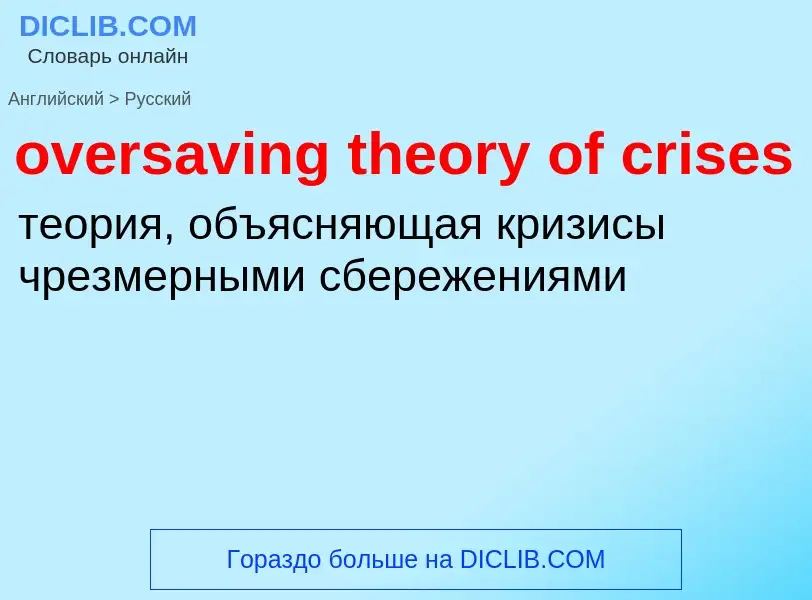Перевод и анализ слов искусственным интеллектом ChatGPT
На этой странице Вы можете получить подробный анализ слова или словосочетания, произведенный с помощью лучшей на сегодняшний день технологии искусственного интеллекта:
- как употребляется слово
- частота употребления
- используется оно чаще в устной или письменной речи
- варианты перевода слова
- примеры употребления (несколько фраз с переводом)
- этимология
oversaving theory of crises - перевод на русский
[s(j)u:pəju:nifi'keiʃ(ə)n]
физика
суперобъединение (всех известных фундаментальных взаимодействий)
существительное
физика
суперобъединение (всех известных фундаментальных взаимодействий)
математика
теория форм
Определение
.
Википедия

In psychology and psychotherapy, existential crises are inner conflicts characterized by the impression that life lacks meaning or by confusion about one's personal identity. Existential crises are accompanied by anxiety and stress, often to such a degree that they disturb one's normal functioning in everyday life and lead to depression. Their negative attitude towards life and meaning reflects various positions characteristic of the philosophical movement known as existentialism. Synonyms and closely related terms include existential dread, existential vacuum, existential neurosis, and alienation. The various aspects associated with existential crises are sometimes divided into emotional, cognitive, and behavioral components. Emotional components refer to the feelings they provoke, such as emotional pain, despair, helplessness, guilt, anxiety, and loneliness. Cognitive components encompass the problem of meaninglessness, the loss of personal values, and reflections about one's own mortality. Outwardly, existential crises often express themselves in addictions, anti-social and compulsive behavior.
The specific symptoms can vary a lot from case to case. Theorists try to address this by distinguishing between different types of existential crises. Categorizations are usually based on the idea that the issues at the core of existential crises differ with the individual's stage in life and personal development. Types commonly found in the academic literature include the teenage crisis, the quarter-life crisis, the mid-life crisis, and the later-life crisis. They all have in common a conflict about the meaning and purpose of one's life. The earlier crises tend to be more forward-looking: the individual is anxious and confused about which path in life to follow, especially concerning education and career as well as one's identity and independence in social relationships. Crises later in life are more backward-looking. They can be triggered by the impression that one is past one's peak point in life and are often characterized by guilt, regrets, and a fear of death. The individual's age does generally correspond to the type of crisis they experience, but not always since there is a lot of variation on the level of personal development. Some people may only experience some of these types or none at all. If an earlier existential crisis was properly resolved, it makes it usually easier for the individual to resolve or avoid later crises.
The problem of meaninglessness plays a central role in all of these types. It can arise in the form of cosmic meaning, which is concerned with the meaning of life at large or why we are here. Another form concerns personal secular meaning, in which the individual tries to discover purpose and value mainly for their own life. The issue of meaninglessness becomes a problem because of the discrepancy between the desire of humans to live a meaningful life and the apparent meaninglessness and indifference of the world, sometimes termed the absurd. Various sources of meaning have been suggested through which the individual may find meaning. They include altruism, or trying to benefit others; dedicating oneself to a cause, such as a religious or political movement; creativity, for example by creating art; hedonism, or trying to live one's life to the fullest; self-actualization, which refers to the development of one's inborn potentials; and finding the right attitude towards one's hardships.
Existential crises have various negative consequences, both on the personal level, such as anxiety and the formation of bad relationships, and the social level, such as a high divorce rate and decreased productivity. They may also have positive effects by pushing the affected to address the underlying issue and thereby develop as a person. Some questionnaires, such as the Purpose in Life Test, can be used to measure whether someone is currently undergoing an existential crisis. Because of the primarily negative consequences, it is important that existential crises are resolved. The most common approach is to help the affected find meaning in their life. This can happen through a leap of faith, in which the individual places their trust into a new system of meaning, or through a reasoned approach focusing on a careful and evidence-based evaluation of the sources of meaning. Some theorists recommend a nihilistic approach, in which the individual accepts that life is meaningless and tries to find the best way to cope with this fact. Other approaches include cognitive behavior therapy and the practice of social perspective-taking.
Outside psychology and psychotherapy, the term "existential crisis" is sometimes used to indicate that the existence of something is threatened.



